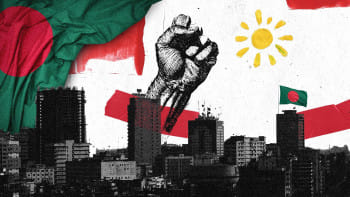We must remain alert to conspiracies

We are currently in what the textbook describes as the fourth phase, or the consolidation phase, of a successful popular uprising. Although the Monsoon Revolution bears no direct parallel to any recent revolution, one might be tempted to draw an equivalence between the July uprising in Bangladesh and the May 1968 uprising in France.
The French had come to view de Gaulle's rule as a "quasi-benign political dictatorship," with de Gaulle assuming power not through a popular vote but after the disintegration of the Fourth Republic during the Algerian Revolution. The assumption of power by Hasina, a usurper bereft of popular support appears similar—except that Hasina corrupted the system and its officials to grab power. But this is not the only similarity between the events of May 1968 in France and July 2024 in Bangladesh. The May 1968 uprising, too, was initially led by students and later joined by the workers. And de Gaulle even fled France briefly to the headquarters of French troops in West Germany, leaving the affairs to Pompidou, only to return stronger later. Some term it as "a revolution without a legacy" because, in a sense, it is still ongoing.
In our case, despite the heavy casualties suffered by protestors, there was a near carnival-like environment post-Hasina's departure. And that is exactly why May 1968 floundered because, according to experts, "if you actually don't redirect and harness all that popular energy strategically against the institutions of power (that was misused to keep a nation under the thumb of an autocrat), you end up, actually, sitting in your own prison. It looks like a carnival, but actually, life goes on around you, and you become a kind of museum of failed revolutionary energy." One of the student leaders later admitted that May 1968 was more a "social" than a "political" revolution.
What will our Monsoon Revolution become? Whatever name it ends up with, 50 years from now, it must not be remembered as a movement that left no impact. It cannot afford to falter in the face of an entrenched opposition within political parties, whose eagerness for power leaves them willing to tolerate truncated institutions—remnants of the old regime still pulling the strings in administration, and conspirators from across the border working to undermine the sacrifices of our youth.
Unfortunately, the institutions of power are still dominated by the beneficiaries of the autocratic regime. They had been moulded to react to the orders of one person and they have been programmed to bespoil all the plans and programmes of a government hoisted to the position of responsibility by the popular revolution. Will they be able to turn the revolution on its head and consign all the energy displayed during the tumultuous days of July and August 2024 to the archives, like May 1968?
We hope that the significance of the events following the successful student-led movement—orchestrated by the pro-AL elements within and outside the administration—has not been lost upon the chief adviser and his colleagues in the interim government.
While the Ansar issue was successfully tackled, other movements have had, and will continue to have, both security and economic consequences.
The unrest in the RMG sector, fomented by anti-national elements and hostile external agencies, has affected our garment exports to the point that many long-term buyers are turning to other suppliers. No prizes for guessing who benefits most from the unrest in Bangladesh's garment sector. Reports indicate a surge in demand for Indian RMG since September 2024.
My question is, and I am sure it reflects the sentiments of the majority of my fellow citizens, has anything been done to identify who are the local conspirators behind the ostensibly "genuine" demands of the garment workers? In September, all 18 demands of RMG workers were accepted. Why has there been such a spurt of agitation in this sector all of a sudden, when in the last 15 years, this front has not seen as many as 114 factories close down at one time?
The recent Mirpur incident reeks of conspiracy. It wouldn't be far-fetched to suggest that, behind a facade of legitimate demands, the real objective is to harm the country's economy at the instigation of supporters of the ousted regime and their foreign backers. In fact, there were no overt demands linked to the agitation and the attacks on law enforcement in Mirpur on October 31.
What the inspector general of police must address most urgently is the manipulation of minorities. One wonders what has happened in the last two months since the ouster of Hasina that has generated these so-called demands. Reportedly, these demands have flowed from the minds of the AL.
The Indian media has, as usual, overexaggerated the incidents. Trump's comments on the minority situation in Bangladesh (interestingly, it seems Trump's love for minorities is confined to only one particular religious group; he did not bat an eyelid at the persecution of Muslims in India, which has continued unchecked for the last 14 years), should not be taken lightly. There appears to be a deep-rooted conspiracy in it. It is important for everyone to understand that becoming pawns in these conspiracies could ultimately prove counterproductive.
While a successful revolution must not give way to mobocracy, we must tackle the situation firmly. We must take fate into our own hands and dictate events rather than be dictated by events. In the latter case, there is a risk of being overtaken by events and leaving our destiny to chance.
Brig Gen Shahedul Anam Khan, ndc, psc (retd) is a former associate editor of The Daily Star.
Views expressed in this article are the author's own.
Follow The Daily Star Opinion on Facebook for the latest opinions, commentaries and analyses by experts and professionals. To contribute your article or letter to The Daily Star Opinion, see our guidelines for submission.

 For all latest news, follow The Daily Star's Google News channel.
For all latest news, follow The Daily Star's Google News channel. 









Comments